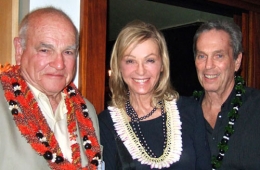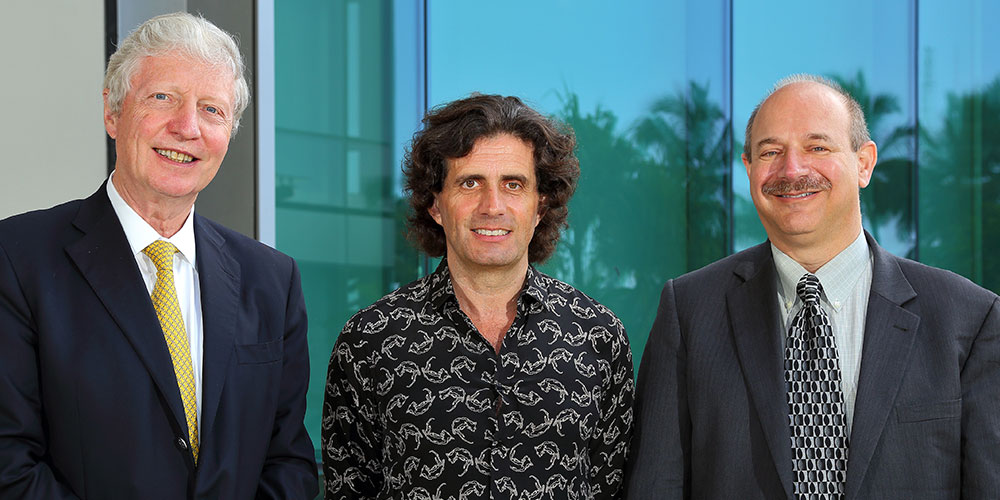Weinman Foundation Fund for Innovation
The Barry & Virginia Weinman Symposium

Barry and Virginia Weinman created the Weinman Foundation Fund for Innovation in 2010, gifting the University of Hawai‘i Cancer Center with a $1.7M fund. Through this generous gift, the annual Weinman Symposium was established. The goal of the two-day conference is to bring together international experts from different fields of science and medicine, promoting collaboration and brainstorming about specific themes in cancer research.
Weinman Symposium at the UH Cancer Center
Co-recipients of the 2011 Nobel Prize in medicine headlined a roster of experts focusing on bridging the U.S. and Asia in the fight against cancer at the May 5, 2014, Weinman Symposium at the University of Hawai’i Cancer Center. The event was free and open to the public, and drew an enthusiastic audience.
“This year’s theme highlighted cancer as a global health issue, and showed the pivotal role Hawai‘i plays in the international efforts to prevent, detect, and treat cancer,” said Dr. Michele Carbone, former director of the Cancer Center. “Researchers in Hawai‘i collaborate with scientists across the U.S. and the Asia-Pacific region, and that benefits everyone.”
2011 Nobel Laureates who spoke at symposium:
-
Jules A. Hoffmann, PhD, professor of integrative biology at the University of Strasbourg Institute for Advanced Studies and an Exceptional Class Research Director (emeritus) at the National Center of Scientific Research (CNRS) in Strasbourg, France.
-
Dr. Bruce A. Beutler, regental professor and director for the Center for the Genetics of Host Defense, and holder of the Raymond and Ellen Willie Distinguished Chair in Cancer Research, in Honor of Laverne and Raymond Willie, Sr., at the University of Texas Southwestern Medical Center in Dallas.
Dr. Hoffmann, Dr. Beutler and Dr. Ralph M. Steinman won the 2011 Nobel Prize in medicine or physiology for their work on discovering underlying mechanisms that trigger activation of innate immunity. The Nobel committee cited their work for opening up new fields of research that could improve vaccination and treatment against infection, cancer and inflammatory diseases.
The Weinman Symposium is supported by the generosity of the Weinman Foundation. In 2010, Barry and Virginia Weinman of Honolulu created the Weinman Foundation Fund for Innovation at the UH Cancer Center with a $1.7 million gift. This fund makes it possible for the Center to invite prominent leaders in cancer research to Hawaiʻi every year. These globally-recognized experts are selected for their work in cancer research and its successful translation into therapy and care. While here, they work with the Cancer Center and establish research collaborations with the faculty.
“We commend Dr. Carbone for leveraging the Weinman Foundation Fund for Innovation to bring five Nobel Laureates to UH since its inception in 2010. Dr. Carbone is universally respected in cancer research, and his personal relationships with these amazing researchers will keep the UH Cancer Center exceptional, and benefit all of Hawai‘i’s people,” said Barry Weinman.
Other nobel laureates who have come to Hawai‘i thanks to the Weinman Award:

-
Dr. Harald zur Hausen, Nobel Prize winner for his work on the identification of Human Papillomavirus (HPV) as the cause of cervical cancer and the development of a vaccine that will hopefully save the lives of millions of women.
-
Dr. Baruch Blumberg was awarded the Nobel Prize in medicine for the discovery of the Hepatitis B Virus and later developed the first vaccine for Hepatitis B, a pre-existing condition that can lead to liver cancer. Hawai‘i has the highest incidence of liver cancer in the nation.
-
Dr. Elizabeth Blackburn who studies the telomere, a structure at the end of chromosomes that protects the chromosome. Blackburn co-discovered telomerase, the enzyme that replenishes the telomere. For this work, she was awarded the 2009 Nobel Prize in physiology or medicine, sharing it with Carol W. Greider and Jack W. Szostak.
The UH Cancer Center is one of 68 research institutions designated by the National Cancer Institute. Affiliated with the University of Hawai‘i at Mānoa, the center is dedicated to eliminating cancer through research, education, and improved patient care. Learn more at www.uhcancercenter.org.
Questions? / More Information
If you would like to learn how you can support UH students and programs like this, please contact us at 808 376-7800 or send us a message.
